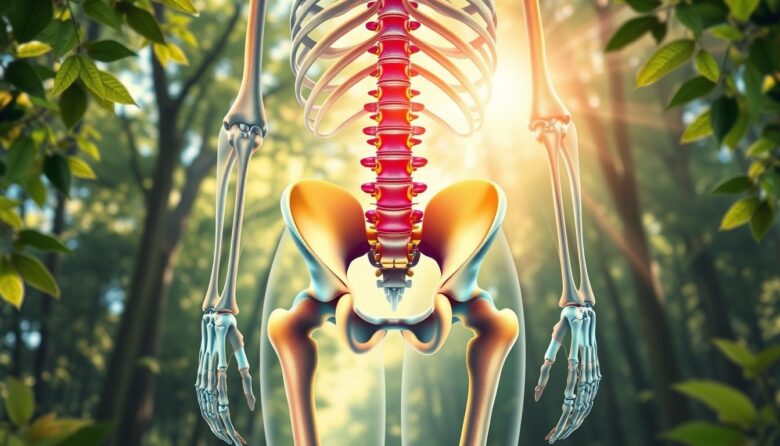As men get older, keeping their bones healthy is key. After hitting their peak bone mass around 30, they start losing bone each year. This loss can lead to osteoporosis, making bones weak and raising the chance of breaks.
For men over 40, it’s vital to know what affects their bones and take action. This helps keep bones strong and lowers the risk of serious injuries.
Bone health depends on several things, like how much calcium they get, how active they are, and their use of tobacco and alcohol. Hormonal changes and some medicines also play a role. As men age, the risk of osteoporosis grows, making it important to fight this with preventive steps.
By focusing on bone health, men over 40 can cut down on fractures. This lets them stay active and independent well into their later years.
Understanding Bone Health and Aging in Men
As men get older, their bones change a lot. They reach their peak bone mass in their early 20s. Then, they start losing bone density slowly. This loss speeds up after 40.
Men also lose testosterone, a key hormone for strong bones. This hormone helps keep bones healthy.
How Bones Change After 40
Bones lose more than they gain, leading to less density. This makes bones weaker and more prone to breaking. It also increases the risk of osteoporosis.
It’s important for men to know about these changes. This way, they can take steps to keep their bones strong as they age.
The Role of Hormones in Male Bone Health
Testosterone is key for bone health in men. When testosterone levels drop, bones become weaker. This makes older men more likely to get osteoporosis.
Risk Factors for Bone Loss
- Inadequate calcium and vitamin D intake
- Physical inactivity and sedentary lifestyle
- Smoking and excessive alcohol consumption
- Certain medical conditions, such as hypogonadism or chronic inflammatory diseases
Knowing these risks helps men take action. They can keep their bones healthy as they age.
Keeping bones strong is vital for men’s health and happiness. By understanding bone changes and hormone roles, men can fight bone density loss and osteoporosis prevention as they get older.
Why Bone Density Matters for Middle-Aged Men
As men get older, keeping their bones strong is key. Bone density shows how healthy bones are. Low density means a higher risk of osteoporosis and fractures.
One in five men over 50 will break a bone because of osteoporosis. This is a big concern.
Bones stay the same from 25 to 50. But after 40, men start losing bone mass at 1% each year. This loss can lead to osteopenia and osteoporosis, causing serious fractures.
Keeping bones healthy is vital for staying mobile and independent as men age. Regular tests can track bone health. They help find ways to keep bones strong and prevent fractures.
Diet, exercise, and lifestyle choices affect bone density in middle-aged men. Understanding bone health and taking action can lower the risk of osteoporosis. This way, men can stay active and independent in their later years.
Essential Nutrients for Maintaining Strong Bones
Keeping bones strong as men age needs a mix of key nutrients. Calcium and vitamin D are especially important.
Calcium Requirements and Sources
Men between 51 and 70 need 1,000 mg of calcium each day. This goes up to 1,200 mg after 70. Good sources of calcium include dairy, leafy greens, and fortified foods. Adding these to your diet helps meet your calcium needs and supports strong bones.
Vitamin D’s Critical Role
Vitamin D is key for calcium absorption and use. You should get 600-800 IU of vitamin D daily. Sunlight is great for making vitamin D, but some men might need supplements too.
Other Important Minerals and Vitamins
- Potassium in fruits and veggies helps keep bones dense.
- Enough protein is needed for bone structure.
- Magnesium and silicon also boost bone strength.
Eating a diet full of nutrients is vital for strong bones as men age. Focus on calcium, vitamin D, and other important nutrients. This helps keep bones healthy and lowers the risk of bone loss with age.
Exercise Strategies for bone health men
As men get older, their bones start to weaken. This makes exercise very important for keeping bones strong. Activities that make bones work harder, like weight-bearing exercises, are especially good for this.
These exercises put pressure on bones, helping them get stronger and denser. There are different levels of these exercises. Walking is a low-impact option that’s easy on bones. Jogging and racket sports are more intense and better for bones.
For those with osteoporosis, it’s safer to stick with moderate-impact activities. High-impact sports like basketball are also good but should be done with caution.
Men over 40 should also do muscle-strengthening workouts. These can be with weights or resistance bands. Doing these exercises 2 to 3 times a week for 20 to 30 minutes is recommended. It’s important to keep increasing the challenge to keep improving bone health.
Hinge, push, pull, and squat exercises are especially good for strengthening bones through progressive training. While swimming and cycling are great for health, they don’t help as much with bone density as weight-bearing exercises do.
| Exercise Type | Impact Level | Bone Density Benefits |
|---|---|---|
| Walking, Brisk Walking | Low | Gentle stress on bones |
| Jogging, Racket Sports | Moderate | Substantial bone-building |
| Basketball, Track Events | High | Significant bone density gains |
| Strength Training (Weights, Bands) | N/A | Improved muscle strength aids bone health |
Improving bone health takes time, especially for those with osteoporosis or older men. By doing a mix of weight-bearing and muscle-strengthening exercises, men over 40 can help keep their bones strong. This reduces the risk of fractures and helps maintain overall health.

Lifestyle Factors Affecting Bone Strength
As men get older, keeping their bones healthy is key. What they do every day affects their bones. Knowing how certain habits impact bone health helps men over 40 stay strong.
Impact of Smoking and Alcohol
Smoking and drinking too much alcohol harm bones. Smoking can make bones weaker and raise the chance of osteoporosis and breaks. Drinking too much can stop the body from using nutrients for bone health.
Medication Effects on Bone Density
Some medicines, like corticosteroids and certain drugs for seizures, weaken bones. These can cause bones to lose density over time. Men on these meds should talk to their doctors about their bone health and look for other treatments.
Weight Management and Bone Health
Keeping a healthy weight is important for bones. Being too thin can cause bone loss because the body uses less for bone growth. Being overweight can also raise the risk of breaks because bones have to work harder.
Eating well and exercising regularly helps men stay at a healthy weight. This supports strong, healthy bones.
| Lifestyle Factor | Impact on Bone Health |
|---|---|
| Smoking | Reduced bone density, increased risk of osteoporosis and fractures |
| Excessive Alcohol Consumption | Interference with nutrient absorption, impaired bone development and repair |
| Certain Medications | Corticosteroids and anti-seizure drugs can contribute to bone loss |
| Underweight | Diversion of resources away from bone-building processes, leading to bone loss |
| Obesity | Increased stress on the skeletal system, higher fracture risk |
By changing these lifestyle habits, men over 40 can help keep their bones strong. This reduces the risk of osteoporosis and other bone health men issues.
Prevention Strategies for Osteoporosis
Keeping bones strong is key for men over 40. Osteoporosis, with its low bone density, affects 54 million Americans. It raises the risk of painful fractures. Luckily, men can prevent osteoporosis and keep their bones healthy for years.
Ensure Adequate Calcium and Vitamin D Intake: Calcium and vitamin D are vital for bones. Men need 1,000-1,200 mg of calcium and 600-800 IU of vitamin D daily. Eating foods rich in calcium and vitamin D, like dairy and fatty fish, helps meet these needs.
- Aim for 1,000-1,200 mg of calcium per day
- Consume 600-800 IU of vitamin D daily
- Include calcium-rich foods and vitamin D-rich sources in your diet
Engage in Regular Weight-Bearing Exercise: Activities like walking and strength training are key. They make bones stronger and denser. Try to do these exercises 3-4 times a week.
- Incorporate weight-bearing exercises into your routine
- Engage in strength training to build and maintain muscle mass
- Aim for 3-4 sessions of weight-bearing exercise per week
Adopt Healthy Lifestyle Habits: Smoking, too much alcohol, and being overweight harm bones. Quitting smoking, drinking less, and keeping a healthy weight help bones stay strong.

By following these tips, men can protect their bones and lower osteoporosis risk. Talking to a doctor can also uncover any health issues that need extra care.
Bone Health Testing and Monitoring
Keeping bones strong is key for men over 40. Regular bone health tests are crucial for checking and keeping track of their bones. The DXA or DEXA scan is the main test for bone density. It gives a detailed look at bone mineral density (BMD).
Understanding Bone Density Scans
The DXA scan is quick, painless, and uses low radiation. It checks the bone density in the spine, hip, and sometimes the forearm. The scan’s results are compared to a young, healthy adult’s. A score close to theirs means bones are healthy.
A score 1 to 2.5 SD below means bones are thinner than usual, or osteopenia.
When to Get Tested
- Men over 70 should get a bone density test.
- Men 50 to 69 with risk factors for osteoporosis should consider a test.
- Men who broke a bone after 50 should get a bone density test.
Regular bone density checks are vital. They help doctors see how bones are doing over time. This helps them know if treatments are working for bone health men.
By being proactive about bone density tests, men can help keep their bones strong. This reduces the chance of serious fractures as they get older.
Conclusion
Keeping bones healthy is key for men over 40. Understanding how hormones and lifestyle impact bones is important. This knowledge helps men protect their bones and lower osteoporosis risk.
Living a healthy lifestyle, eating right, and exercising can boost bone strength. These actions help prevent fractures. Regular bone tests and working with doctors are also crucial. They help create plans to keep bones strong as men age.
Focus on bone health to ensure a good life in later years. By following proven methods, men can stay active and independent. This is true even as they face the challenges of aging.










